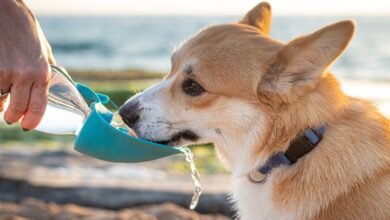Living in the UAE, pet owners know the challenges of keeping their furry friends healthy amid frequent sand and dust exposure. The arid climate in Dubai and other parts of the country brings unique risks for pets, especially with sandstorms and dust-filled winds affecting their health. Here’s a look at the top health issues that pets face in these conditions and effective ways to prevent them.
Respiratory problems from dust inhalation
Frequent dust exposure can lead to respiratory problems in pets, especially those with sensitive respiratory systems, like brachycephalic breeds (Bulldogs, Pugs). Dust inhalation may cause coughing, sneezing, and even difficulty breathing.
Prevention Tips: Keep windows closed during dusty days, especially when sandstorms are forecasted. If possible, limit your pet’s outdoor activities on these days and use air purifiers to keep indoor air cleaner.
Eye irritation and infections
Dust particles can easily get into pets’ eyes, causing irritation, redness, and, in some cases, infections like conjunctivitis. Pets with larger, more exposed eyes, like Pugs or Persians, may be particularly prone to this issue.
Prevention Tips: Use a damp cloth to gently wipe around your pet’s eyes after they’ve been outside. For pets prone to eye irritation, consult your vet about pet-safe saline eye drops.
Skin allergies and irritation
Sand and dust can stick to a pet’s fur and skin, leading to dryness, itching, and even rashes. Over time, this exposure can aggravate skin allergies, especially in pets with sensitive or short coats.
Prevention Tips: Regularly brush and wipe down your pet after outdoor activities to remove any lingering dust. Pet-safe moisturizers can also help prevent dry skin. During severe sandstorms, try to keep outdoor time to a minimum.
Ear infections from dust buildup
Dusty environments can contribute to ear infections in pets, particularly in breeds with floppy ears, which trap dust and moisture. Ear infections may cause head shaking, ear scratching, and a noticeable odor from the ears.
Prevention Tips: Check your pet’s ears regularly and gently clean them with vet-approved solutions. For breeds prone to ear infections, more frequent check-ups and cleaning might be necessary during particularly dusty periods.
Paw irritation and sand burns
Sand and dust, especially in the intense summer heat, can irritate pets’ paws. Hot sand can lead to burns, while constant dust exposure may cause dryness and cracking.
Prevention Tips: Avoid walks during the hottest parts of the day, and consider paw protection like boots if your pet is comfortable with them. Rinse your pet’s paws after walks to remove any dust and prevent cracking.
Gastrointestinal upset from ingested dust
Pets can accidentally ingest sand and dust while grooming or drinking from outdoor water sources. This ingestion can lead to digestive issues like vomiting or diarrhea.
Prevention Tips: Always provide fresh, clean water to discourage your pet from drinking from outdoor sources. If your pet shows signs of digestive upset, monitor them closely and consult a vet if symptoms persist.
Exacerbation of existing allergies
Dust and sand can aggravate existing allergies in pets, leading to symptoms like itching, runny nose, and watery eyes. These symptoms are especially common in the dry climate of Emirates like Sharjah and Abu Dhabi.
Prevention Tips: Use hypoallergenic bedding for your pet and keep their living area dust-free. Regular grooming helps remove allergens trapped in their fur, reducing allergic reactions over time.
Hot spots and bacterial skin infections
Dust particles can carry bacteria that cling to a pet’s skin, especially in the UAE’s humid areas, where dust and humidity create breeding grounds for bacteria. This can lead to hot spots—itchy, inflamed skin patches that pets may scratch until they bleed.
Prevention Tips: Clean your pet’s fur after each outing, and regularly inspect their skin for any signs of irritation or redness. Antibacterial wipes can help minimize bacterial buildup, but always consult your vet for skin care tips suited to your pet’s needs.
Joint and muscle issues from high-impact dust exposure
In desert climates, dust particles can build up in the environment, leading to poor air quality that affects more than just the lungs. For pets that spend a lot of time outside, this exposure can contribute to joint and muscle inflammation, especially in older animals.
Prevention Tips: Provide a soft, clean indoor space for your pet to relax, especially during dusty days. Regular, gentle exercise and joint supplements (as recommended by your vet) can help mitigate these issues.
Dehydration linked to sand and dust exposure
Heat and dust exposure can accelerate dehydration, especially in active pets. Dehydration can cause lethargy, dry gums, and decreased skin elasticity, and it’s particularly risky for pets that spend time outdoors.
Prevention Tips: Keep water bowls accessible and consider portable water dispensers for outings. In particularly dry weather, monitor your pet’s water intake closely and increase their fluid access if needed.
The UAE’s unique desert environment presents some specific health challenges for pets. With preventive measures tailored to minimize sand and dust exposure, pet owners across Dubai, Abu Dhabi, and the wider Emirates can help protect their pets from these common health issues. Taking a proactive approach to grooming, hydration, and air quality management ensures a healthier, happier life for your pet in this beautiful but challenging environment.



